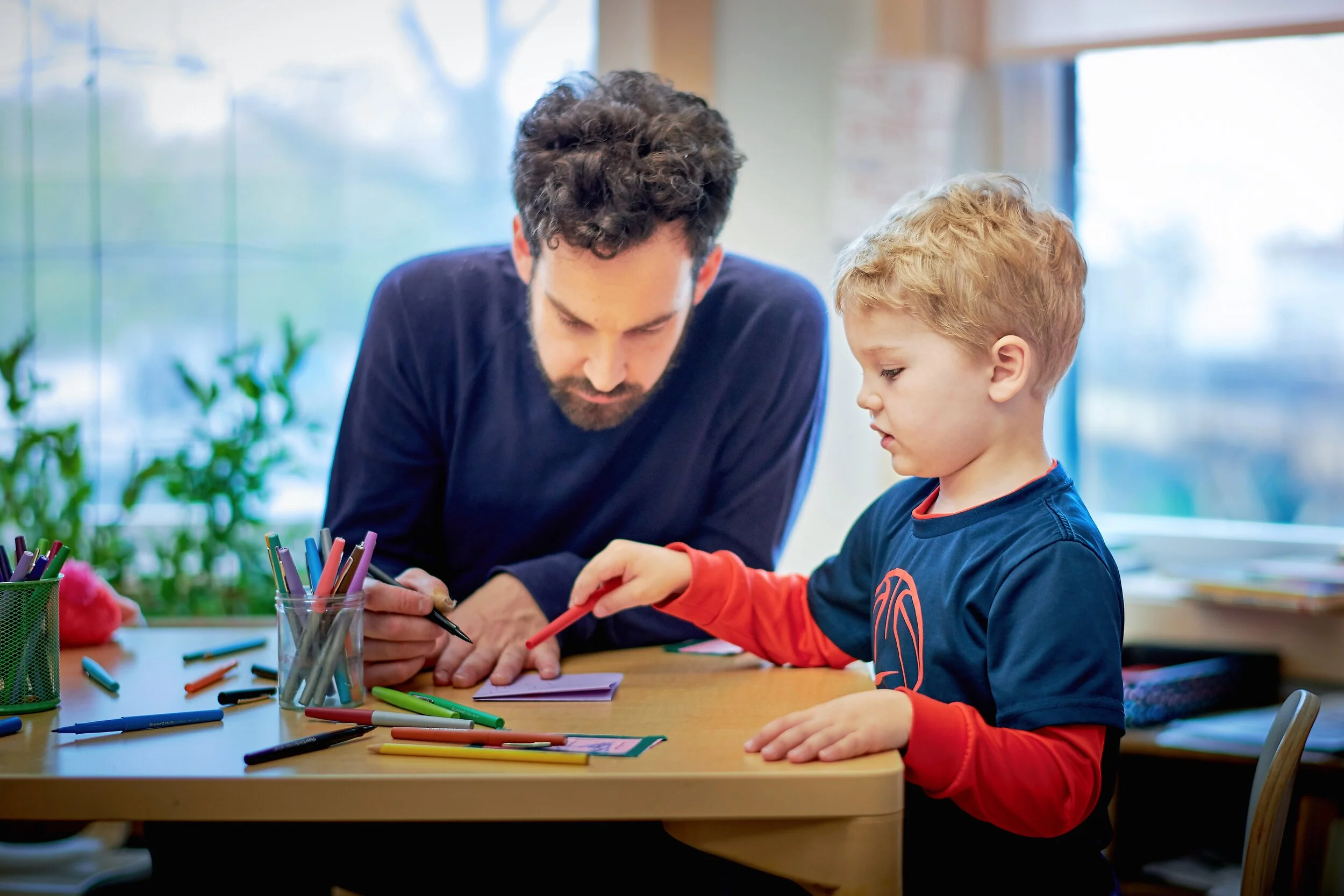We respect and address separation as an ongoing developmental issue, and provide a gradual entry into preschool at the beginning of the year.
We invite children to follow their interests, make choices, connect with each other, and come together as a group to share conversations, songs, stories and ideas. Under the guidance of trusted teachers, children explore the arts, science, numbers and literacy in meaningful ways and develop healthy ways to express their emotions, share their ideas and interact with their peers. We foster autonomy and exploration, individual and group problem solving, negotiation and collaboration. We develop close relationships with children and take their ideas seriously, allowing us to support optimal growth and development for each child.
At Park West, we work closely with families, and collaborate with parents. By joining our cooperative preschool, parents are actively involved in school operations, and they play an important role in daily classroom life by assisting regularly in the classroom.
Separation
At Park West, we view the separation experience as an ongoing developmental issue – both emotionally and intellectually. Our approach to parent-child separation is gradual and individualized, which enables your child to draw on their own developing resources to learn how to handle the uneasiness of being on their own, a little at a time.
Research has shown that it is easier for a child to enter a new setting when accompanied by a parent. It helps them feel comfortable with and adjust to a new place, and the adults who will take care of them. Since each child and family is unique, we work with parents to build the relationships and trust necessary to support each child as they become familiar with the school.
Even if your child is excited by the prospect of going to school, it can take time for them to understand exactly what that means, learn the routine, know what the classroom is like, and form relationships with the teachers and other children. Before we feel comfortable letting parents go, we like to see that each child has developed a measure of security, a trusting relationship with the teachers, or easily settles into a classroom activity that interests them – which indicate they are ready to separate.
What we expect from parents
During the first few weeks of school, we expect a parent or support person, like a grandparent or babysitter, to be at school to guide and support your child. This doesn’t mean you will be spending the entire day in the classroom. In fact, you can expect to spend a lot of your time outside the classroom and return at key transition points, such as cleanup and snack time. This gradual approach helps us meet our overall goal of making school a comfortable and positive experience for your child.
If your child is comfortable the first day of school and doesn’t express any separation fears, that’s great. Teachers will make a plan with you about leaving the room that will address your child’s needs, while keeping each member of the group feeling safe and supported.
Some children may experience separation anxiety at other times during the year – usually after an extended absence or during family changes – so teachers are ready to offer support and make a separation plan during those times as well.
Assisting
Assisting is one of the best parts of joining Park West Cooperative. It provides an inside look at your child’s preschool experience, and allows you to see first-hand how your child navigates group life. You come to know the teachers and the other children intimately while working in the classroom.
Approximately every seven to nine weeks, you join your child in class, arriving early and bringing snack for the group. During class, you’ll prepare and set up snack, and you might read books to children, help put names on papers, or join kids playing around the sand table. After class, you stay a little longer to help with cleanup. Assisting is only done by parents.
Discipline
helping our students work toward self-regulation
While we strive to offer children autonomy and the space to make choices, when those choices are unsafe or problematic, we set clear limits so children understand what is expected and use logical and natural consequences and redirection to help children begin to self-regulate. We want to help children understand how their behavior impacts their experience, as well as others in the group.
Immaturity and strong emotions can contribute to troubling behaviors, and we expect to guide children through the process of recognizing and expressing their feelings, their intent, and acceptable ways to cope with difficult situations. Physical expressions like hitting and biting are always unacceptable, and children are given support to find other means of expressing themselves.
Park West teachers help children clarify their intent, communicate verbally, and work out conflicts with their peers. Both parties in a conflict are given the time and support needed to express their point of view and work out a solution.
We see our role as guides and mentors in the classroom, and as such we don’t impose punishments, but work with children to find appropriate ways to interact with each other.
So, if a child is throwing sand, we might ask why, remind them it’s unsafe, and have them help sweep up the sand. If they’re unable to stop after that, we would help them find a different activity, reminding them that they can return when they’re able to refrain from throwing. We wouldn’t have a child sit isolated in a time out, but would help them engage in another activity.

